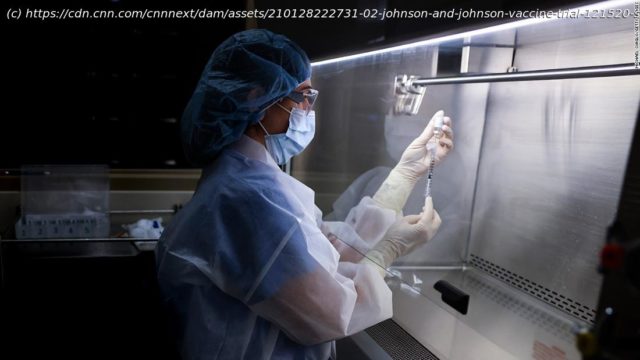A third Covid-19 vaccine, one made by Johnson & Johnson, could be authorized for use in the United States in the near future.
Data about the single-shot vaccine released Friday, and the company is now collating its data to apply to the US Food and Drug Administration for emergency use authorization.
The vaccine was made through a collaboration of J&J’s Belgium-based vaccine division, Janssen Pharmaceutical, and Beth Israel Deaconess Medical Center, and it works a bit differently.
Here’s what’s known about how it works and how it will fit into the mix of vaccines. How effective is it? Johnson & Johnson’s Covid-19 single-shot vaccine was shown to be 66% effective in preventing moderate and severe disease in a global Phase 3 trial, the company announced Friday. The vaccine is 85% effective overall at preventing hospitalization and death in all regions where it was tested. Its efficacy against moderate and severe disease ranged from one country to another: 72% in the US,66% in Latin America and 57% in South Africa. This was measured starting one month after the shot. In South Africa,95% of cases in the trial were due to a variant known as B.1.351, which is known to be more contagious and carries mutations that may make the virus less susceptible to the antibody immune response — including antibodies prompted by vaccination. Even those who got moderate cases of Covid-19 in the trial tended to develop a milder course and fewer symptoms, said Dr. Mathai Mammen, Janssen’s global head of research and development. From one month after the shot, all hospitalizations and deaths occurred in the placebo group. How it works The J&J vaccine is what is known as a non-replicating viral vector vaccine, using a common cold virus called adenovirus 26. Scientists made this vaccine by taking a small amount of genetic material that codes for a piece of the novel coronavirus and integrating it with a weakened version of adenovirus 26. J&J scientists altered this adenovirus so it can enter cells, but it cannot replicate and make people sick. AstraZeneca uses a similar platform, but its adenovirus comes from a chimpanzee. The adenovirus carries the genetic material from the coronavirus into human cells, tricking them into making pieces of the coronavirus spike protein — the part it uses to attach to cells. The immune system then reacts against these pieces of the coronavirus. « So you’re not being infected with the virus that can give you Covid-19 when you get this vaccine.






